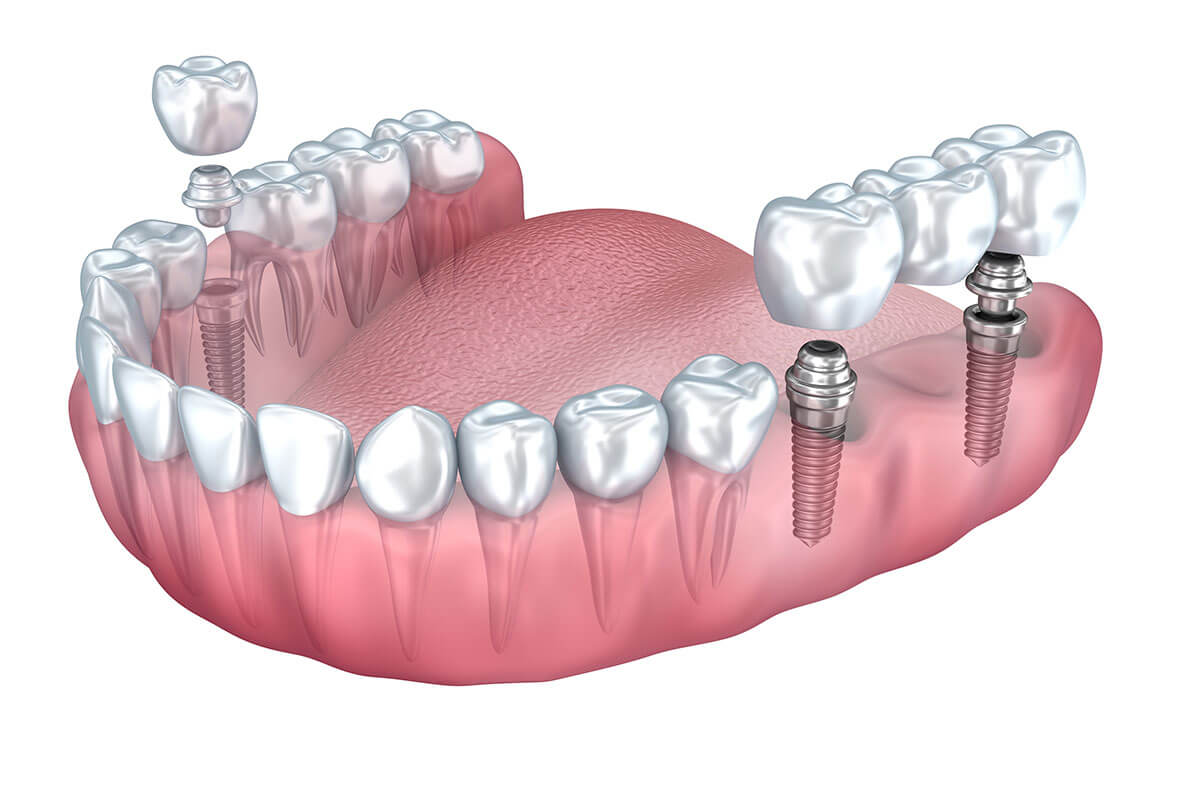Posterior Dental Implants
Wednesday 9th, October 2024
Why Posterior Tooth Loss Shouldn’t Be Ignored
Tooth loss is a common issue that can affect the aesthetics and functionality of the mouth, particularly when it occurs in the posterior region (back of the mouth). At Dental Implants & Aesthetics, creating functional dentistry is the pinnacle of our philosophy. In this blog, we will discuss the significance of Posterior Dental Implants and why they are often the preferred treatment choice for restoring loss of function.
Replacing missing posterior teeth is crucial to restoring not just aesthetics but also the function and long-term health of your mouth. Posterior teeth, known as ‘premolars and molars’, play a vital role in chewing and maintaining the overall structure of your jaw. When these teeth are lost, it can lead to significant oral health issues. Dental implants provide an optimal solution for restoring missing posterior teeth.
For multiple missing teeth in the posterior region of the mouth, a dental implant bridge is a great restorative treatment option.

We understand that maintaining the natural balance and function of the mouth is paramount. Posterior tooth loss not only affects functionality but also leads to the gradual loss of jawbone volume. The roots of your teeth stimulate the surrounding bone tissue, keeping it strong and healthy. When a tooth is lost, the bone in that area no longer receives stimulation and begins to resorb, potentially leading to further tooth loss and a sunken facial appearance.
Why Dental Implants Are the Gold Standard For Posterior Tooth Replacement
Dental implants are the gold standard in restoring function when it comes to replacing posterior teeth. Here’s why:
- Preservation of Jawbone: One of the primary benefits of dental implants is their ability to prevent bone loss. The implant acts like a natural tooth root, providing necessary stimulation to the jawbone and preventing the resorption that occurs after tooth loss.
- Restoration of Chewing Function: Dental implants restore the full function of your posterior teeth. Unlike other replacement options like dentures, which may shift or provide less-than-optimal force distribution, implants allow for the same chewing power as natural teeth.
- Prevent Overeruption of Opposing Teeth: Dental implants help prevent the overeruption of opposing teeth by providing a stable and functional replacement for missing teeth. Overeruption occurs when a tooth moves beyond its normal position due to the absence of an opposing tooth; dental implants can prevent this by filling the gap and maintaining proper bite alignment.
- Protection of Adjacent Teeth: Preserving natural tooth structure is important whenever possible. Unlike traditional dental bridges, which require reducing adjacent teeth for support, dental implants are standalone restorations that do not compromise neighbouring teeth.
- Long-Term Stability: Dental implants are a fixed permanent solution. With proper care, they can last for decades, making them a cost-effective option in the long run. The titanium post integrates with your jawbone, ensuring a stable foundation for the crown or bridge restoration that can withstand the forces of natural chewing function.
- Customised Prosthetic Solutions: Each dental implant restoration is uniquely crafted to fit your mouth and mimic the function of your natural teeth, providing the functional support your bite needs.
The Process of Replacing Posterior Teeth with Dental Implants
Replacing missing posterior teeth with implants involves a step-by-step approach:
- Comprehensive Assessment: The process begins by thoroughly evaluating your oral health, considering bone density, gum health, and overall dental structure to determine if dental implants are the right solution for you.
- Implant Placement: During the procedure, a titanium post is surgically placed into the jawbone at the site/s of the missing tooth. Over time, this implant will fuse with the bone through a process known as ‘osseointegration’. This phase occurs over 3 months (minimum).
- Restoration: Once the implant has fully integrated with the bone, a custom-made crown or implant-supported bridge is attached to it. These restorations are designed to function like natural teeth, restoring the appearance and, most importantly, the functionality of your bite.
Dental implants offer unparalleled benefits for replacing posterior teeth, from restoring chewing efficiency to preventing jawbone deterioration. From a prosthodontic perspective, dental implants represent the most effective and long-lasting solution for posterior tooth loss. By choosing implants, you are investing not only in restoring your smile but also in preserving your overall oral health.
Whether you are missing one or multiple posterior teeth, consulting with our specialist Prosthodontist, Professor Vasilios Chronopoulos, can help you understand how dental implants can restore your smile and prevent further complications.
Start your Journey Today
Contact us at one of our Gold Coast locations to speak to one of our dental professionals and find out if dental implants are the right option for you.















